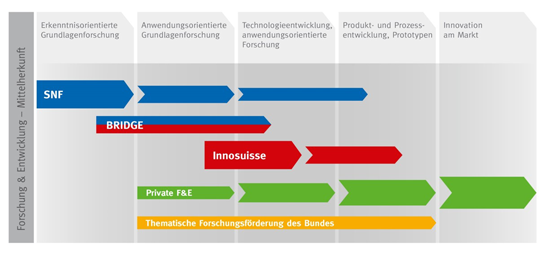Use-inspired basic research

The core mission of the Swiss National Science Foundation (SNSF) is to promote basic research. The SNSF does not grant funding for applied research with an immediate commercial potential. However, it does support research that is linked to practical issues and that also increases scientific knowledge. As a result, researchers have been able to declare their SNSF applications "use-inspired" since 2011.
Use-inspired basic research
- recognises that research which combines the aspect of gaining scientific knowledge with an orientation towards application is becoming increasingly important both nationally and internationally;
- ensures the adequate evaluation of use-inspired applications by taking into account their broader impact as an evaluation criterion and by engaging external reviewers from the practical realm.
Is my project use-inspired?
Projects may be use-inspired in different ways, depending on the discipline. The SNSF is therefore reluctant to provide a global definition of "use-inspired basic research". However, the following list of characteristics can be helpful in determining whether an application is use-inspired.
Criteria indicating that a project might be use-inspired:
- Aim: the project aims to produce scientific insights and solve practical problems;
- Cognitive/Conceptual: although the project is primarily concerned with basic science, it might help to resolve practical problems or issues;
- Source of the research question: the question was defined by scientists in collaboration with a user/practitioner community;
- Implementation in the near future: the project has the potential to be implemented in the near future (e.g. by means of technology transfer financed with a Innosuisse grant);
- Types of output: the project will produce academic and non-academic publications;
- Target audience: the results will be made accessible to a lay public outside academia;
- People involved: the research team is composed of scientists and practitioners;
If several of the above-mentioned criteria are met, the project is likely to be use-inspired.
Optimised evaluation of use-inspired research projects
In 2016, the SNSF commissioned the consulting firm Technopolis to conduct a study of the category "use-inspired research". The study emphasises the complexity of use-inspired proposals as a result of their duality between science and practice. It also makes a series of recommendations aimed at optimising the evaluation of use-inspired research projects:
- adopting the typology developed in the study to define the category more clearly;
- fully implementing the DORA declaration;
- giving greater weight to the broader impact of projects during the evaluation by the Research Council;
- including at least one expert from practice;
- ensuring greater diversity in the evaluation bodies in order to match the diverse nature of the proposed research projects.
These recommendations have been implemented step-by-step by the SNSF.
Gapless research funding
The category "use-inspired basic research" ensures funding for projects between pure basic research (normally funded by the SNSF) and applied research (often funded by the Swiss innovation agency Innosuisse). It is not possible to draw a clear line between funding by the SNSF for projects whose central aim is to increase scientific knowledge, and funding by the Innosuisse, which is more market-oriented. The two organisations agree that overlapping funding should be the goal.
With this in mind, the SNSF and the Swiss innovation agency Innosuisse have set up the funding scheme BRIDGE, which complements the support they already provide for Swiss science and innovation. The programme is aimed at exploiting the economic and societal potential of scientific research by promoting the transfer from scientific knowledge to innovation.
In the space between basic and applied research, the type of financing depends on the degree to which a project is use-inspired:

National Research Programmes (NRPs): in-depth studies of current problems
NRPs are geared towards finding solutions and are therefore also use-inspired. The scientific knowledge they generate is aimed at solving Switzerland's most pressing problems. In this context, knowledge and technology transfer is key: the research groups participating in the programmes take a question from practice as their point of departure. As the research results become available, they are analysed in collaboration with target groups to identify potential applications. Such transdisciplinary research work generates a wide range of different approaches aimed at tackling social, political and economic challenges.